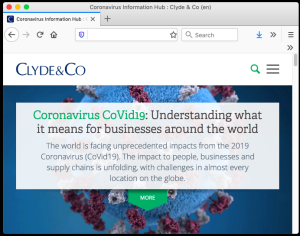
Simon McConnell
By Simon McConnell, Managing Partner, Hong Kong and Joel Harris, Professional Support Lawyer, Clyde & Co
Introduction
With the number of confirmed infections continuing to rise globally since the first reported cases in late December, the Novel Coronavirus (Covid-19) is likely to represent a significant exposure for the insurance market. By comparison, the SARS epidemic in 2003 was the fourth-largest insurance loss in Hong Kong history with losses of HK$325million and total economic losses estimated from US$40Billion to US$50 Billion. Covid-19 has the potential to be more significant pandemic than SARS, given that the number of infections and death toll exceed SARS, and the serious disruption to supply chains in Mainland China. As of 20 February 2020, the total number of cases worldwide stands at over 75,000 and counting, the vast majority of which are in Mainland China. By comparison SARS infected around 8,000 people.

Joel Harris
Potential Insurance Exposures
Covid-19 is likely to generate claims across several lines of business. As with other pandemics, losses are anticipated in life and health insurance, particularly group health and travel policies, as well as event cancellation cover. There may be additional potential exposure in employment practices liability or workers’ compensation for hospital or healthcare workers who are infected in the course of their employment. Contingent business interruption claims may also arise. If such claims are presented, the cause of the peril interrupting the business will need to be determined.
Whether a policy responds is dependent on the particular wording, and as always a starting point is to carefully check the full policy wording when considering any potential Covid-19 claims.
Claims Considerations
- The nature of an insurance policy is to protect against unforeseen or unknown risks and will not protect against known circumstances. At the moment there is not a uniform approach by insurers in this regard. Different dates have been specified by different insurers as to when the Covid-19 became a known circumstance, but somewhere between 20 January and 25 January would seem to be the likely dates adopted by the insurance market.
- For event cancellation, it is common to see exclusions for SARS, Avian and Swine Flu or Atypical Pneumonia or other pandemic influenza outbreaks. As a general principle, insurers carry the burden of proof when seeking to rely on an exclusion clause; it is crucial that there is sufficient evidence that Covid-19 fits within any communicable disease exclusion and ultimately this may require expert medical evidence.
- The Hong Kong Courts have previously considered issues in interpreting business interruption policies and the requirement for losses sustained to be as a result of a “notifiable disease”. New World Harbourview Hotel Co. Ltd v ACE Insurance & Ors [2012] HKEC 264, concerned when cover would be triggered after the notification of SARS in 2003. The case confirmed that insurance cover is not (usually) retrospective and that loss will only arise as a consequence of the insured peril that triggers the policy. In that case, losses that occurred before the date the SARS virus was added to the 1st schedule of the Quarantine and Prevention of Disease Ordinance were not covered by the Insured’s policy.
The Hong Kong Government gazetted the Prevention and Control of Disease Ordinance (Amendment of Schedule 1) Notice 2020 to include “Severe Respiratory Disease associated with a Novel Infectious Agent” on 8 January 2020. The Notice describes “Severe Respiratory Disease associated with a Novel Infectious Agent” as referring to a cluster of viral pneumonia cases of unknown cause occurring in Wuhan, Hubei Province, since December 2019.
- In Hong Kong business interruption losses may be further complicated by the potential need to determine the proximate cause of losses in circumstances where the political situation over the last six months may also have led to a significant reduction in business profits.
Future Insurance Products for Pandemics
Since the SARS outbreak in 2003, Hong Kong and Mainland China have seen multiple influenza pandemics. The increased occurrence of such outbreaks raises issues of how the insurance market could better respond to future pandemics. One potential solution may be parametric pandemic insurance. The other could be insurance-linked securities such as pandemic catastrophe bonds. The World Bank’s pandemic catastrophe bond (WBPCB) could potentially be triggered by Covid-19. Data provided by the World Health Organisation (WHO) on the spread of infection is used as the primary reporting source for the WBPCB. Based on recent figures, the World Bank may deem Covid-19 as a potential “event” under the terms of the WBPCB, should the outbreak meet the pre-determined criterion of the bond.
Increasing the market for insurance-linked securities has been identified as a priority by the Hong Kong Government in the 2019-2020 budgets. The HK Government alone has now announced a HK$30 billion economic relief package. The Insurance Authority is also considering a new regulatory regime to facilitate the issuance of insurance-linked securities. Hong Kong-issued pandemic catastrophe bonds could provide additional reinsurance capacity to Mainland China to help manage future risks for pandemics.
Assistance
Should you have any queries relating to policy coverage or claims arising from Covid-19, please feel free to contact Simon McConnell (Simon.McConnell@clydeco.com), who is based in Clyde & Co’s Hong Kong office.
For more information and insights, visit the Coronavirus Information Hub
Authors
Clyde & Co accepts no responsibility for loss occasioned to any person acting or refraining from acting as a result of material contained in this summary. No part of this summary may be used, reproduced, stored in a retrieval system or transmitted in any form or by any means, electronic, mechanical, photocopying, reading or otherwise without the prior permission of Clyde & Co.
This article © Clyde & Co 2019

















